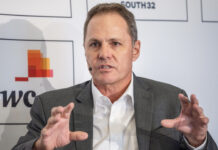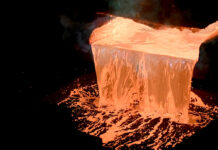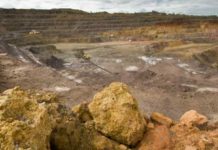
[miningmx] — IN AN opinion piece published earlier today on Miningmx, contributor Jan de Lange bemoaned the fact that the Chamber of Mines’ AGM has morphed into a colourless function, which only served to underscore the organisation’s perceived fall in status among the bastions of power in SA’s business landscape.
Compared to recent occurrences of this event, Tuesday’s was a particularly drab affair. ANC secretary general Gwede Mantashe was lined up ostensibly to offer some first-hand guidance over where the governing party was heading with the nationalisation debate. His unexpected illness, however, meant the agenda consisted of some opening remarks by AngloGold Ashanti CEO Mark Cutifani and Xolani Mkhwanazi’s presidential review, followed by the election of office bearers. All done and dusted in little more than an hour.
One theme, though, raised by Mkhwanazi that has until now received very little airtime, concerned climate change and a proposed carbon tax regime for South Africa.
This very real issue has taken a back seat to the nationalisation debate, but with National Treasury due to publish its revised proposals on carbon taxes by year-end, Mkhwanazi came out guns blazing over what he thought any government framework on the issue should take cognisance of.
An initial draft by the National Treasury had suggested taxes ranging from R75/tonne of carbon dioxide emitted to R200/tonne, depending on the severity. Mkhwanazi made it clear that the industry had no appetite for such taxes, describing it as no more than a single instrument in a wide array of measures that should be considered to reduce greenhouse gas emissions.
“What most categorically does not enjoy mining sector support is the implementation of a carbon tax regime that is no more than a blunt instrument to raise revenue for the National Treasury without necessarily achieving a lower carbon intensity objective,’ he said.
This is exactly what Australia’s government has been accused of doing in a range of proposed measures that even that eternal optimist, Mark Cutifani, has described as “life threatening’ to that country’s mining industry.
“It is indicative of how bad the relationship between industry and government (in Australia) has become,’ Cutifani said.
Referring to the USA and Canada’s reluctance for such measures, as well as Europe’s major concessions to export industries, Mkhwanazi said South Africa could not implement carbon taxes if its major mining competitors have not yet done the same.
“When all is said and done, it remains the fundamental contention of the Chamber and its members that in the absence of a global agreement on climate change, the introduction of carbon taxes in South Africa will accomplish little other than to erode the global competitiveness of the mining sector.’
NATIONALISATION
Nowhere can two or more people interested in mining meet these days without discussing nationalisation. The same held true for the Chamber’s AGM.
“The nature and size of the mining industry’s future contribution will.be significantly determined by the manner in which a conclusion is brought to the controversial issue of nationalisation,’ commented Mkhwanazi.
Admitting that the outcome lies squarely in the hands of the ANC, Mkhwanazi said the Chamber has engaged constructively with the research committee established by the African National Congress to consider state intervention in the mineral sector.
“Known as Sims, the committee is chaired by the Deputy Minister of Economic Development, Mr Enoch Godongwana, who less than two months ago was the recipient of a comprehensive Chamber of Mines’ submission which sets out in detail the interventions that the mining industry considers it can effectively make to ensure that many more South Africans can derive benefits from the country’s extensive mineral endowment.
“Having established a meaningful engagement platform, the Chamber of Mines will continue to interact with Sims in the interest of finding an acceptable solution to a matter that is fundamentally significant to the future of South Africa.’
ELECTIONS
As for the formalities, Mkhwanazi and Cutifani were re-elected as President and Vice-President, while Optimum Coal’s Mike Teke was elected as the second Vice-President in the place of Anglo American Platinum’s Neville Nicolau. Nicolau was not available for re-election.










